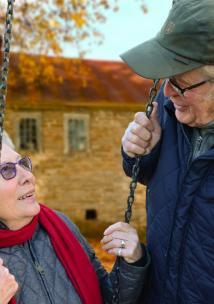Report: How you feel urgent care services could be improved

From December 2020, NHS England launched a new system called NHS 111 First. If you have an urgent, but not life-threatening, health problem you can now contact NHS 111 First to find out if you need to go to A&E.
The public are encouraged to call NHS 111 to be directed to the correct service, whether that is an Emergency Department (Accident & Emergency), their GP, or self-care. Callers to NHS 111 can now receive time slots at local Emergency Departments (EDs) or other urgent care departments, as well as receive time slots with GPs or out of hours GP services. The new service aims to reduce waiting times at EDs and limit the number of people in waiting rooms, to prevent the spread of COVID-19.
This project followed on from one in March 2021 to try and find out if patient experience was improving and awareness of the service increasing, the March report can be found here: Experiences of urgent medical care in Shropshire | Healthwatch Telfordandwrekin
Key Findings
First Point of Contact
48% of 181 respondents said they contacted NHS 111 first when they had an urgent medical need, this compares with 75% in the same survey carried out in Telford & Wrekin in Spring 2021.
- The proportion of people whose first point of contact was NHS 111 First varied across Shropshire, Telford & Wrekin, for example, it varied from 35% in the TelDoc Primary Care Network (PCN) to 60% in the Wrekin PCN.
Overall satisfaction with contacting NHS 111
43% of patients who contacted NHS 111 rated their experience as ‘Very Good’ or ‘Good’. (This compares to 38% of those who completed the same survey in Telford & Wrkein in Spring 2021.) Nearly one third of people rated their experience as ‘very poor’.
Experience of Booked Appointments
Twenty-four of the people who contacted NHS 111 First (26%) were booked into appointments with other services. Of these 58% of people told us that they would rate their experience of booking an appointment through NHS 111 as ‘Good’ or ‘Very Good’, 25% described it as ‘Poor’ or ‘Very Poor’.
The carers experience
Twenty-seven of the 34 people who contacted NHS 111 on behalf of somebody they cared for (79%) reported that they were able to discuss the patient’s needs with the NHS 111 health advisor. Of the seven who reported they weren’t able to discuss the patient’s needs, five reported that it was because the call was not answered in a timely manner.
Awareness of NHS 111 First
52% of all people (93) told us they were not aware that NHS 111 First could book appointments with services such as GP, A&E and Urgent Treatment Centres, 38% (68) that they were aware and 10% (17) were not sure. These proportions were very similar to those indicated in the spring 2021 survey, 55% were not aware, 35% were aware and 10% were unsure.
- Awareness varied across Shropshire, Telford & Wrekin from 20% of people from the TelDoc GP practices to 71% of people from the South-West Shropshire practices.
Intention to use NHS 111 First in future.
Overall, 95 (53%) of people were ‘very likely’ or ‘somewhat likely’ to contact NHS 111 the next time they were seeking urgent medical care, this compares to a figure of 70% in the spring Shropshire survey.
Experience of being treated
91 (52%) rated their treatment as ‘Good’ or ‘Very Good’, compared to 46% in the spring, 22 (13%) as ‘Average’, compared to 15% in the spring and 59 (34%) as ‘Poor’ or ‘Very Poor’, compared to 38% in the spring.
What is most important when seeking urgent medical care?
People told us that the two most important criteria were:
- ‘My issue being solved quickly’
- ‘Seeing someone who is well qualified/a specialist’

